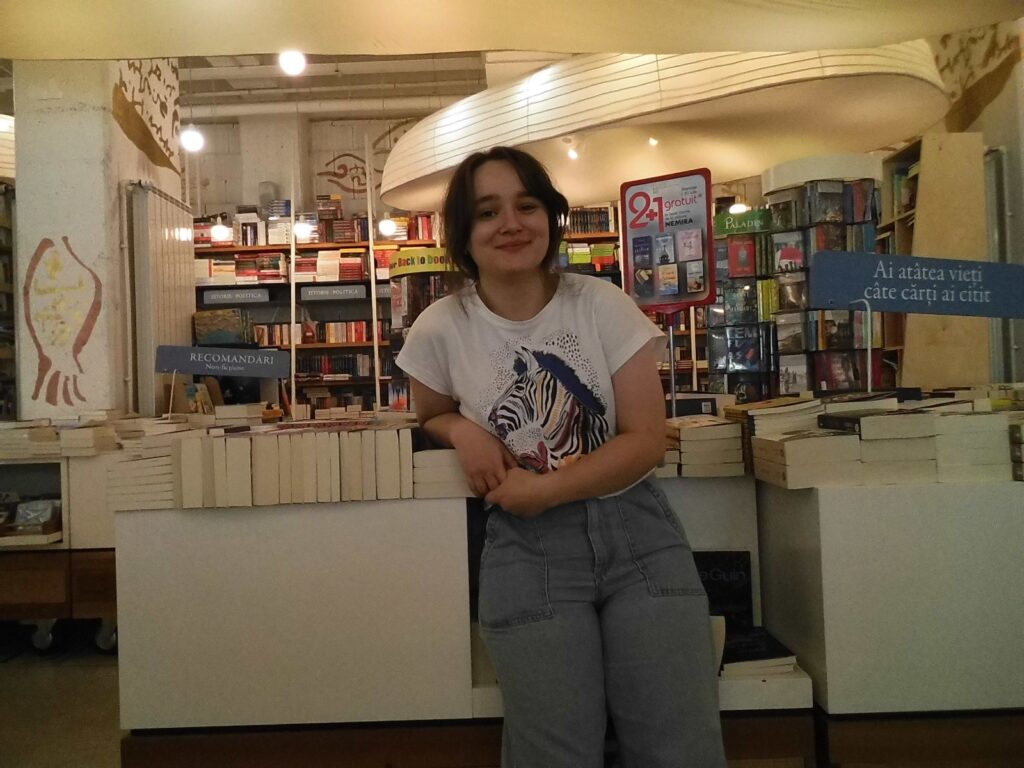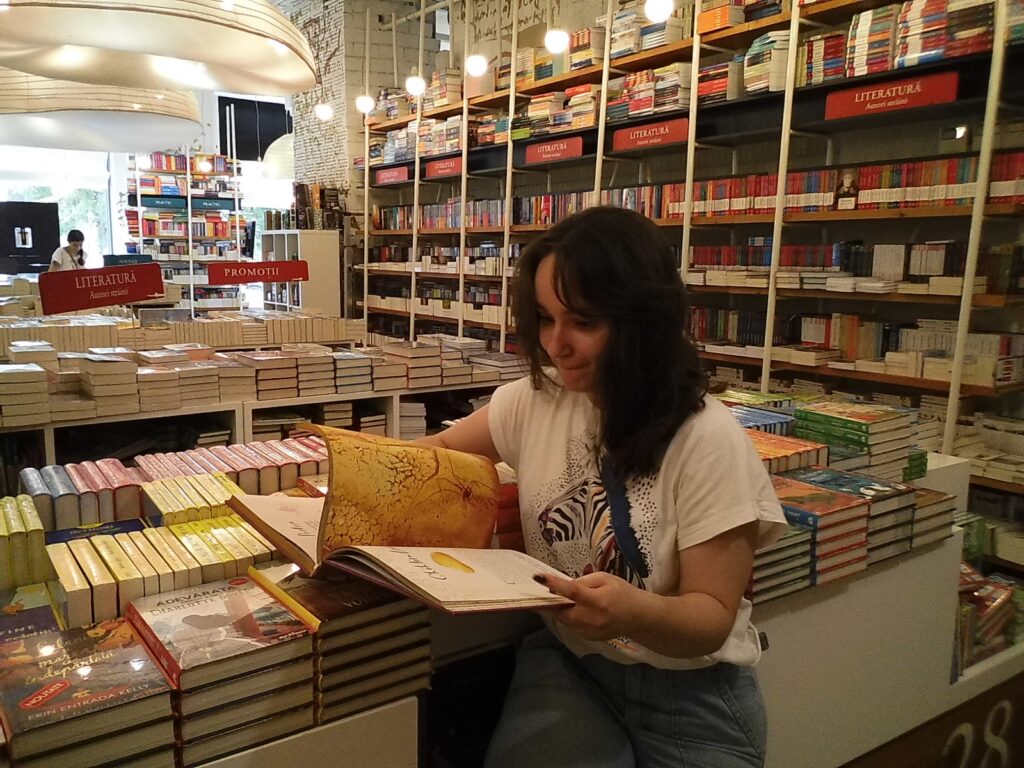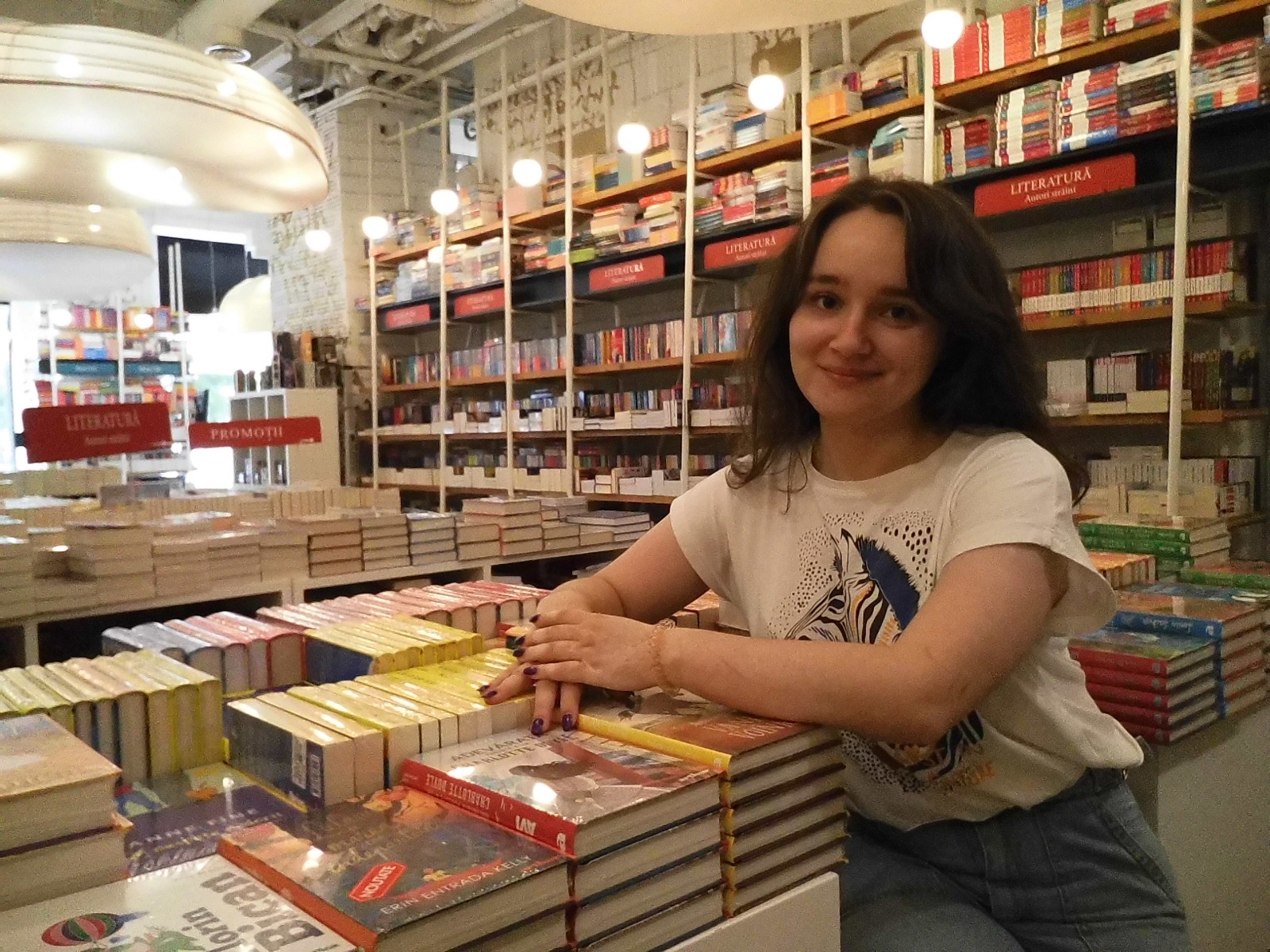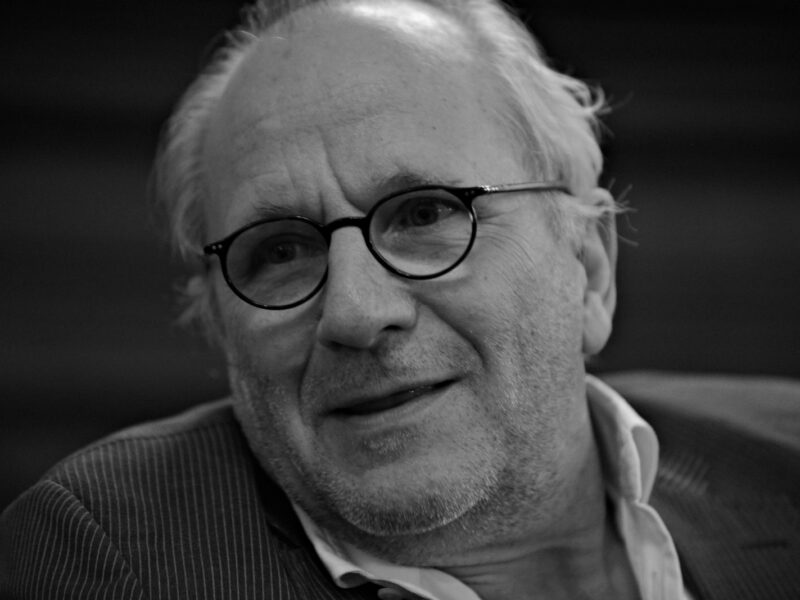Athena Băloiu is a bookseller at Humanitas Cișmigiu bookshop. She’s been working here since 2019, and previously, she worked at Cărturești Băneasa and collaborated with British Council. She graduated from the Faculty of Foreign Languages (English-Japanese), at the Christian University “Dimitrie Cantemir”, and she is now able to practice her foreign language skills to guide foreign tourists at the bookshop or around Bucharest.
What does your working day look like?
A working day depends on the shift. Morning shifts begin with a quick walk around the bookshop, to straighten up and tidy up the most disordered areas (usually the tables for children and the new arrivals tables), and we print out the previous day's sales report immediately afterwards, to fill the shelves with the books that had been sold. We also make the orders to each publishing house in the morning. The evening shift usually begins with taking over and labelling the book parcels [from publishers, Ed.] that come in every day, and arranging the books on the shelves. We usually have additional taskuri as well, such as collecting books that need to be returned to publishing houses or setting up the café area for events. Naturally, we support customers with anything they need and we stay at the checkout for payments all this time.
When did you start working at the Humanitas bookshop and how did you get this job?
I started working at Humanitas part-time initially, in December 2019. I had started university two months before and I really needed a job that would cover the small expenses to ensure my independence: The phone bills, hobbies etc. I was walking on the boulevard with a friend when I noticed that there was a book launch at Humanitas Cișmigiu. It wasn’t the first time I was entering the bookshop, but it was the first event I participated in. My friend wanted to purchase a book, and at the checkout I had the inspiration to ask if, by any chance, they were hiring people. I spoke with a bookseller, the manager at the time, who told me to send him my CV, and one week later I was signing the contract. A few months later, after the general quarantine was imposed in the spring of 2020, I switched to the full-time schedule.
What are the necessary skills of a bookseller, what stood out once you were hired?
Being a role that involves a lot of interactions with new people, having the ability to respectfully interact with the public, the customers, is the most important one. You need to remain calm in any situation, and help or find the right type of support for every person. Moreover, you must have a good memory that will help you quickly memorise hundreds of covers and titles. The more experienced colleagues are a huge help in the beginning, however you must learn to fend for yourself very quickly. It is also very important to enjoy what you do, to be passionate about reading and books, and not get scared of a certain field that you are “not good at”, and to always be up to date with the publishing world.
Where did you learn what it entails and how to practice the job of a bookseller?
The first steps I took in the bookshops’ world was at my first job, at Cărturești Băneasa. It was there that I worked under pressure, with customers, with accessories, books, and gift recommendations for the first time. I learned that everyone entering a bookshop has a curiosity which I, as bookseller, can satisfy. Either they need something very specific that they don't know where to find or they have to give a present to someone they know nothing about, the bookseller is the person they go to. The team at Băneasa helped me become a person who quickly and efficiently finds solutions and who eases unpleasant interactions with some customers, which helps me a lot at Humanitas Cișmigiu, being located on a central boulevard walked by thousands of characters daily, agreeable or not. I also learned to organise my tasks and working schedule efficiently, so that I neither burnout, nor remain without things to do.
Are there interactions between the Humanitas chain bookshops? Do you have exchanged experiences, or general meetings?
The Humanitas bookshops interact constantly thanks to the customers. We are often being asked for books or even objects that we don’t have at Cișmigiu (for example, objects from the Japanese collection, from the bookshop in Magheru), however, they are in stock at other bookshops, anywhere around the country, so we bring them by transfer. If the book in question is in Bucharest, we let the customer know where to find it and they go to purchase it themselves. There is a very short distance between Kretzulescu, Magheru and Cișmigiu, so it’s us who often rush for urgent transfers, most of the time before or during the events that pleasantly surprise us, leaving us without books.
You graduated from a foreign language faculty, with an English-Japanese major. How much does this specialization help you in your day-to-day work?
Unfortunately, Japanese only helps me on the literature side, as I can recommend Japanese authors or I know what novelties deserve more exposure. I have much fewer opportunities to speak Japanese at the bookshop, compared to English. I speak English with customers at least once a day. Being on the ground floor of the Cișmigiu Hotel, there are many tourists who enter our bookshop, either looking for the shelves with English books or tourist guides, or having questions related to Bucharest and orientation. It’s very pleasant to be able to help them find what they are looking for or recommend them a restaurant with Romanian cuisine.
From the outside, being a bookseller sounds very bohemian, walking among books, recommending them to those interested. Do you have time to experience this bohemian time and what are the other responsibilities that dilute any reverie?
Honestly, the only moments that turn me off involve interactions with difficult people, and the moments when I feel that I’m working in vain, when promotions change and I find out that I must return on the table a publishing house I had taken off and crammed it on the shelves only a month ago… Or when I collect a bunch of dead stock books (that haven’t sold in a very long time) for a return and I am told that at least half of the books cannot be given away for various reasons.
Returning to recommendations, how often are you asked for them and what are the criteria according to which you recommend a book or another?
There is someone who needs help choosing a book or a gift every day. My colleagues organised a “Bookseller’s Recommendations” table, in order to facilitate recommending books, and we display the books we read that we think are most suitable for the public, along with a note including a short summary of each book, and a reason why it should be read. We have specific areas, shelves/tables with new released books and popular titles, bestsellers, depending on the person who needs a recommendation or the person who needs a gift.
There is an area for toddles, with easy-to-read stories, and flashcards and memory games, perfect for helping them improve their vocabulary. The tables for teens are organised by age to ease the choice of a suitable book. The shelves with literary fiction are organised by the publishing house, and we try to group each fiction genre from a publisher together as much as possible, be it SF, crime, romance etc, to make the recommendation of books easier. We also have an area with books chosen and recommended by certain publishing houses, according to the titles’ popularity.

Did you receive feedback from people once the books you recommended were read by them?
Yes, it happened, and most of the times to children’s books. There were parents who asked my opinion in regards to the gift they would buy for their kid, and they returned a few weeks later, telling me they needed the rest of the series or the other books written by the author I had recommended, because the little one has a new passion. I am good at recommending children’s books because it’s the area I take care of mostly, and I know which titles are the most popular and appreciated by the little ones. However, I read a lot of non-fiction for my own pleasure, a category for which recommendations are rarely asked for. And when I'm asked for a fiction recommendation, the conversations I've had with my friends/colleagues about what they've read come to my rescue.
What kind of books are sold well at the Cișmigiu bookshop and what are the bestsellers lately?
Since we are the representative bookshop of the Humanitas and Humanitas Fiction publishing houses, we have the largest sales at these two publishers. Honestly, the bestseller in the bookshop is Meditations , by Marcus Aurelius. This book has not been moved from the “Bestseller” table for at least two years, and it is in the top sales list every month. And from the other publishing houses, the books from Baroque publishing house have sold very well lately, especially the Byzantine collection, or, from Casa Bună, the book Țigan Țăndări. And when it comes to children's books, I would say that The Adventures of Dunno is and will remain the most popular for a long time.
What does the robot-portrait of the reader/customer from Humanitas Cişmigiu look like?
From what I have noticed, there are two clear categories of customers: Those who are loyal to the Humanitas publishing house, they attend all events related to Humanitas books and they purchase all new arrivals, and neutral customers, who are attracted to the bookshop’s design and atmosphere, but also to the employees. There are also devoted customers, who come on the same day, once a week, or who come twice a month, on the 15th, when we have the 3+1 for free promotion, and at the end on each month, during our “Open Books Night”, when we have a 20% off discount on all titles in the evening.
Thanks to the central position of the bookshop, I imagine that it is also visited by many tourists or foreign readers. What is the frequency of their visits and what do they usually purchase?
I have actually observed many tourists in the bookshop in the last few months, either alone, or in large groups, who usually go straight to the shelves with foreign books. We have worked a lot on expanding this area, and the portfolio with books in foreign languages, precisely for this reason. The area being right next to the counter, gives us the opportunity to interact with them more. They are also interested in tote bags with paintings or pictures with Bucharest, and postcards, which come with the question “Do you also have stamps?”. Unfortunately, we don't have stamps, but there are two post offices very close to the bookshop.
Some time ago, I spoke with Mihail Vakulovski, your colleague from the Humanitas bookshop in Braşov, about his bookseller “diary” on Facebook, #LibrărieCuUșileDeschise, and about the most peculiar questions, requests or dissatisfactions. What are your most hilarious stories in this regard?
Customers often ask us whether we have all kinds of items, batteries, blankets, hair accessories, but the funniest moment was when an elderly lady sat at the table at the bookshop’s café and asked us for the soup menu. She was very confused when I explained her that all I could offer her was a coffee. Sometimes I have interactions with some customers that leave me completely speechless, but I force myself to be as calm and unbiased as possible. My favourite saying in times that really test my patience is: ”I’m overwhelmed with customer servicealready”.
What is the greatest satisfaction of your experience at the bookshop so far?
When I have a list of tasks that seems overwhelming, as it usually happens on the first day of the month, when we have a lot to do, or when the manager is on vacation and I am "in charge", it is very satisfying to see that I can handle it and I don't give in to the pressure. Organising shelves/tables on fast-forward, orders, customers, merchandise, it all happens simultaneously but becomes manageable. Especially if you have a team you can rely on.

What about the biggest challenges?
The biggest challenge is definitely interacting with customers. Every person is different, and when you work with the public you come into contact with all kinds of people, from extremely awesome people, who linger on your mind for a long time, to angry, frustrated people, who can ruin your entire day. Furthermore, the events, book launches, interviews etc are quite stressful activities, because everything must be in order, the bookshop must be tidy, and we must have everything that is necessary.
What would you recommend to young people just starting out, interested in working in a bookshop?
I imagine it sounds like an easy job, but it’s not. You don’t just have to like books to be a bookseller. You need to have knowledge in the field, to understand the logic of the publishing world, but also to be strong, in order to handle a role in customer service. However, it is a good first job to develop as a person and to gain experience. Personally, it has helped me calm my social anxiety a lot, and to gain confidence in my own abilities.
What is the perfect combo of books and music for you?
When I'm diving into a history book, the most relaxing thing is listening to classical music, especially piano, but definitely something without lyrics. When I read fiction though, I mostly like lo-fi (low fidelity) playlists with more upbeat and catchy instrumental songs.
[The photos are part of Athena Băloiu's personal archive.] [Translated into English by Simina Barna.]



